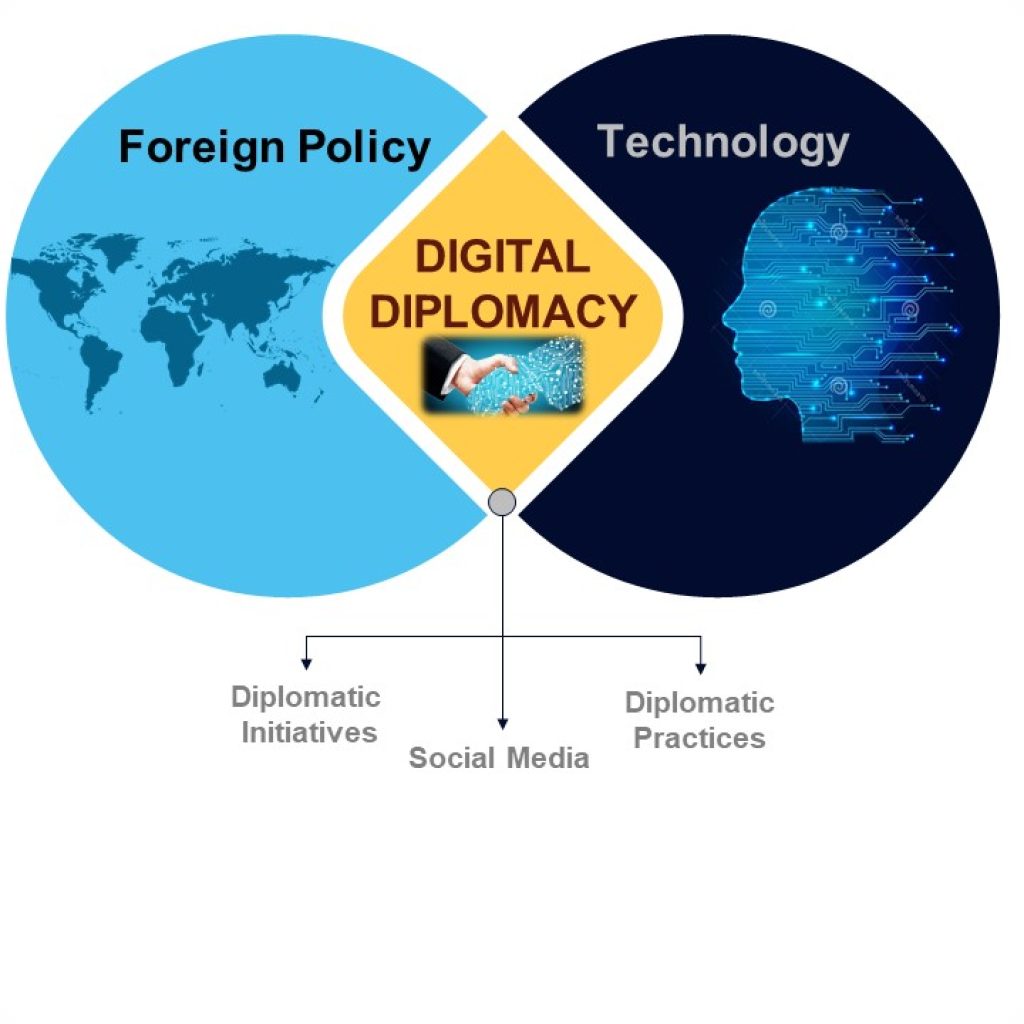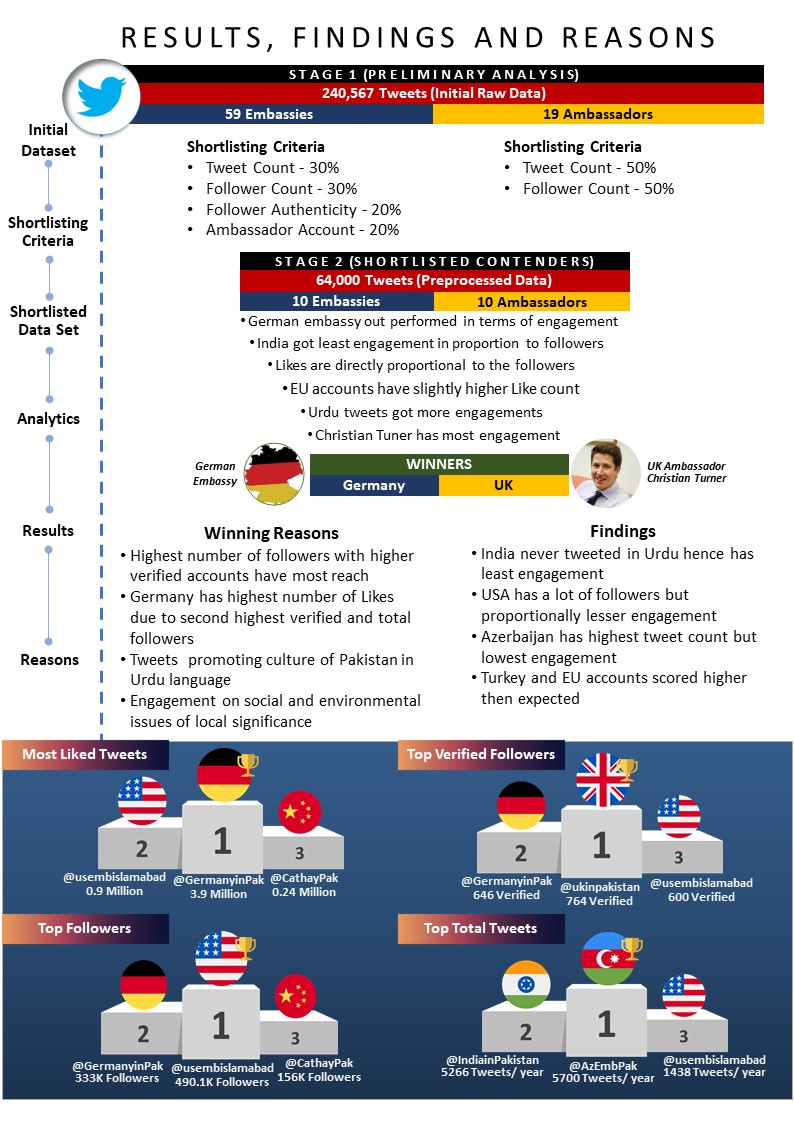Overview
Digital Diplomacy is defined as the intersection of foreign policy and technology, incorporating diplomatic initiatives, practices, and their manifestation through social media. Governments, leaders, and militaries worldwide use social media platforms like Twitter to pursue their policy goals. This study explores the most active foreign embassy Twitter accounts operating in Pakistan to see how they engage their target audiences over key issues. Results are drawn by analyzing the Twitter footprint of embassy accounts, tweet activity patterns, and key narratives derived from a discourse analysis of their tweets.

Key narrative points guiding the social media diplomacy of foreign embassies in Pakistan comprise human rights, climate change, and education. Moreover, ambassador accounts and tweets in the local language generate a lot more traction and engagement, pointing toward the extraordinary significance of the human touch within the digital space. The study concludes by extending some pointers for embassies to achieve diplomatic objectives.
1. Objectives
The focus was to analyze the strategy and diplomatic functioning of embassies and ambassadors in order to identify the following:-
- Best performing Embassies in Pakistan.
- Best performing Ambassadors in Pakistan.
- Key factors and reasons for success.
2. Methodology
Twitter profiles of 50 embassies and 19 ambassadors were analyzed with a collective tweet count of 240,567. Embassy profiles were analyzed based on three major criteria including tweet activity, following, and authenticity of following. The analysis criteria were quantified by three simple parameters, i.e., tweet count, total following, and the number of verified followers for quick and meaningful ranking.
2.1 Data Acquisition
Ambassadors’ individual accounts were analyzed individually also since there are certain accounts operated by ambassadors with no organizational presence on Twitter. The criteria of “Following Authenticity” was disregarded for analysis of Ambassador accounts as various other factors (social, personal, political, and employment, etc) might have contributed to their following besides their diplomatic engagement in Pakistan.
2.2 Scoring Criteria
To shortlist profiles, weights were assigned to analysis criteria to ascertain the overall score of each Ambassador and Embassy. Social media content posted by respective Embassies gets a lot of reach with Ambassador’s personal Twitter profile. Therefore, due weightage was given to embassies having ambassador accounts. Shortlisting criteria for Embassies and Ambassador accounts are given as under:-

2.3 The Final Dataset
The final dataset comprised 64000 tweets of 10 shortlisted Embassies accounts and 10 shortlisted ambassadors accounts. These tweets were scraped via Twitter’s REST API from Jan 2018 up until Nov 2022. Tweets were analyzed by comparing their tweeting patterns, narratives, and follower networks.
- The US has 44 % more followers than any other account.
- The UK has the highest number of verified followers.
- EU has the highest percentage of verified followers (1.2%).
- Ambassador Christian Tuner got maximum engagement by tweeting about local, social, and cultural issues.

3. Analytics and Insights
3.1 Likes vs Followers Analysis
The data set reveals that total Likes (engagement metric) are directly proportional to the number of followers. With exception of the counter-intuitive case of the USA, the relationship between the total number of followers and a total number of engagements in terms of Likes is directly proportional. Germany has received a higher number of Likes than expected whereas USA and India have lagged despite higher followership. The Indian account has scored the least amongst shortlisted embassy accounts in terms of engagements. EU accounts have a slightly higher number of Likes.
3.2 Why some diplomatic missions scored better than others?

The German Embassy received by far the highest engagement mainly because of two factors i.e., former German Ambassador Martin Kobler, who actively engaged with local audiences by tweeting on diverse themes and a comparatively higher number of Urdu tweets. Urdu tweets have also considerably increased engagements in Canada, the UK, Azerbaijan, and KSA. Turkish account has also proven to a comparatively popular because of its frequent engagement through the Pak-Turk friendship theme. The UK, US, and Chinese embassies also scored well on English-language tweets, given their frequent tweets on bilateral cooperation and events-related tweets. India has never tweeted in Urdu, thereby explaining its least average engagements. EU has scored comparatively better, mainly due to a higher percentage of verified followers (1.2% verified followers, highest in the dataset).
The German Edge?
- Tweets in Urdu have shown higher engagement levels than in English.
- Chinese and Turkish accounts are the only two accounts that had higher engagements in terms of Likes in English than in Urdu.
The Hidden Anomalies?
- India never tweeted in Urdu.
- USA: too many followers, too less engagement.
- Azerbaijan has the highest tweet count but the lowest engagement.
- Turkey and EU accounts scored higher than expected.
3.3 Ambassadors
A primary objective of the study was to investigate which of the ambassadors got the most engagement from Twitter users. Interestingly, while the UK embassy’s organization account didn’t fare well, the UK High Commissioner in Pakistan, Christian Turner, is currently the most popular diplomat in the Pakistani digital space in terms of both the number of followers and level of engagement (in terms of Likes and Retweets). He precedes the Canadian, Saudi, Chinese, and Turkish ambassadors, each of whom respectively commands a highly influential social media presence. It should also however be noted that there are no official Twitter handles for the German and US Ambassadors in Pakistan, who instead use official embassy handles which receive equal if not more engagement than the accounts listed above. Honorable mention in this regard is the current German ambassador to Pakistan, Alfred Grannas who uses his screen name for the organizational handle @GermanyInPak. In terms of the most prioritized issues, human rights, climate change, tourism, and aid stood out as some of the key narratives of these ambassadors. Saudi and Turkish ambassadors, on the other hand, focused more on bilateral relations and brotherhood as their standard diplomatic stance.

3.4 Temporal Analysis of Shortlisted Embassies
The curious case of Azerbaijan Handle: Nagorno-Karabagh Conflict
In terms of cumulative twitter activity, Azerbaijan Embassy was observed to be fourth in comparative diplomatic standing, however, the overwhelmingly large number of tweets (16119 tweets) is attributed to the Nagorno-Karabakh conflict in late 2020. Azerbaijan Embassy actively utilized its account for narrativization while also highlighting its good relations with Pakistan.
Tweet Activity of Embassies (Excluding Azerbaijan)
The German Embassy’s tweet activity has also decreased significantly since former Ambassador Martin Kobler’s term ended in April 2019 (depicted in Fig below). This was followed shortly by the COVID pandemic during which the activity of different embassies peaked as they emphasized their support to the Pakistani people through medical supplies and general awareness. The US Embassy in contrast remained a lot more active during the US withdrawal from Afghanistan throughout the Summer of 2021. Its activity has also increased in recent months celebrating the 75th anniversary of the US-Pakistan relationship. The Indian embassy has remained consistent with reporting official visits and engagements of the Indian diplomatic mission in Pakistan.

3.5 Discourse Analysis

Looking further into the key narratives of these embassies, it is evident that all of Pakistan’s diplomatic partners focused primarily on socio-economic development, although in different forms. Embassies from Western countries (such as the UK, the US, and Germany) tweeted mainly on climate change and human rights issues. In contrast, non-western partners such as China tweeted primarily on poverty alleviation, flood relief, and infrastructure development (in the form of CPEC). In essence, showing how a neo-liberal and rights-based approach focusing on broader ideological concepts from the West is contrasted against more tangible projects and programs from non-western partners. Hence, overall, societal issues have been the most tweeted category by chosen foreign embassies, followed by political/economic issues. In contrast, security-related issues fared relatively lower in priority in total. However, Azerbaijan’s overwhelming tweets about its Nagorno-Karabakh conflict increased the overall number of tweets regarding security-related matters.

4. Key Takeaways
- Considerable Diplomatic Focus on Developmental Narratives. Despite Pakistan being often framed in security-related discourses within international politics, socio-economic and development issues comprised the key focus of some of the most active foreign missions and embassies operating in Pakistan.
- Thematic Diversity Draws Engagement. Tweets on diverse themes, bilateral cooperation, and events increase the Twitter footprint in terms of the number of Likes and engagements.
- Native Languages Boosts Engagement. Tweeting in Urdu received comparatively much higher engagement levels as exemplified by the German and UK embassy accounts as well as the EU.
- Diplomatic Popularity Contest. UK High Commissioner in Pakistan, Christian Turner, is currently the most popular diplomat in the Pakistani digital space in terms of both the number of followers and level of engagement (in terms of Likes and Retweets) due to a more personalized touch with more focus on human rights, girl education and tourism.
- Spatio-temporal Alignment of Narratives. The frequency timeline of Twitter activities of the embassies account is aligned with the events i.e., the COVID pandemic, the 75th anniversary of Pakistan, etc.
- Narrative Differentiation: West and the Rest. Western Embassies tweeted mainly on environmental and human rights issues, whereas, other Non-western partners focused more on developmental issues.
- Significance of Socio-centric Narratives. Societal issues have been the most tweeted category by chosen foreign embassies, followed by political/economic issues and security-related issues.
- Diplomatic Efficacy on Digital Front.
– US Embassy and consulate accounts were the most active in terms of total tweets and followers.
– China prioritized narratives related to economic and national security the most.
– German Embassy generated the most engagement in terms of Likes and Retweets and led in pushing ‘proactive’ agendas.
5. Recommendations
Based on the analysis and key findings, embassies may choose to increase outreach and engagement by:
- Tweeting on diverse themes, bilateral cooperation, and event mapping of discourse.
- Tweeting in a regional language attracts a larger audience and generates conversations.
- The use of the personal account of the ambassador in addition to embassy accounts creates more impact.
- Discussing subjects of multiple interests to engage people from all walks of life.
- Tweeting on special occasions of national or cultural importance.
6. Conclusions
An embassy is expected to maintain friendly foreign relations between the home country and host governments and bridge communication between the two. Embassies in Pakistan are working as per their designated roles, however current digital era requires constant proliferation of relevant, personalized, and semantically nuanced content to generate more impact and outreach. Digital space demands hybrid diplomacy, i.e., both conventional and digital diplomacy to achieve diplomatic objectives. The investigative analysis of the Twitter data set offered interesting and useful insights into the narratives being prioritized by Pakistan’s key diplomatic partners – especially those narratives which generated the most traction and impact across the Pakistani digital space. Recommendations incurred from key conclusions after analysis of the Twitter accounts of embassies will help to achieve the diplomatic objectives and project a soft and friendly image.
The complete study can be downloaded here [pdf].
